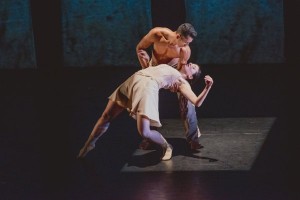
Melissa Bourkas and Miguel Perez of BodyTraffic perform “Kollide” at the Broad Stage in Santa Monica. Photo: Ben Gibbs.
[Los Angeles struggles to support a pure dance company. You’d be surprised how the city trails behind NY, SF or Seattle. Yet this weekend, some good news: a small company called BodyTraffic! With a premiere from Kyle Abraham! I wrote for the L.A. Times on the Saturday night show:]
Coming off prestigious gigs at New York’s Joyce Theater and Jacob’s Pillow in Massachusetts, the award-winning Los Angeles-based repertory company BodyTraffic presented two sold-out programs at Santa Monica’s Broad Stage this weekend that demonstrated a most hopeful combination of choreographic and performing excellence.
With just 10 personable, persuasive dancers, BodyTraffic hustled to fill the stage, and the lead performers, appearing in all three pieces, put their stamina to the test. Yet this same recirculation of dancers made for great cosmic reverberations, showing how a penchant for amplitude and precision translated between everything from Barak Marshall’s hellbent shtetl heteros to Richard Siegel’s slap-happy jazz performers.
That the program featured as its centerpiece the world premiere of Kyle Abraham’s aching, chamber-sized “Kollide” (2013) — his first new piece since he won a MacArthur Fellowship “genius” grant last month — was certainly a boon.
Set to compositions by Icelandic cellist Hildur Guðnadóttir and Valgeir Sigurðsson, “Kollide’ is surely a timeless masterwork, yet for now it feels form-fitting to company founders-dancers Lillian Rose Barbeito and Tina Finkelman Berkett. The two powerhouse women (Berkett conveyed noble strength; Barbeito was transparently raw) alternately pass through the arms of stunning Guzmán Rosado, who we often see only from behind, his wide back obscuring all.
At first, in this soft-hued environment, love and desire are the fuel for tender backbends, hand-holding and Abraham’s signature hiccuping, ambulatory adjustments. Later, when betrayal is added to the fire, the subtle changes (and stases) in texture are heart-rending.
Abraham’s structural prowess here is Balanchine-strong: He’s always four steps ahead of the viewer, spooling out patterns and reversals, using a small background couple (Melissa Bourkas and Miguel Perez) to weave a constant percolation of instability into the partnerings. Yet the gently harrowing trajectory was as if from Antony Tudor — a modern quadrille of love, sorrow and brokenness that began and ended with the turn of a shoulder.
Barak Marshall’s episodic, theatrical “And at Midnight, the Green Bride Floated Through the Village Square…” (2012) opened the program like a cork pulled from a well-aged, centuries-old bottle. Out flowed a torrent of stomping Yiddish tunes, with coiled, staccato group movements and detailed narrative rants and pleas from Marshall’s ageless mother, dancer-singer Margalit Oved.
The unison work was impeccable; new company dancers (Christopher Bordenave, Kalin Morrow, Cooper Neely, Yusha-Marie Sorzano) moved playfully yet with perfect precision. As in Alvin Ailey’s “Revelations,” each boisterous new song reactivated one’s appetite and redrew the milieu. How easily this could be a full-evening work.
Following on the heels of Abraham’s “Kollide,” which left Barbeito broken, the closing images in Richard Siegal’s “o2Joy” (2012) now read as an ode to exuberant integrated selfhood. After Andrew Wojtal’s turn lip-syncing “All of Me,” Barbeito’s concluding solo restored what had been broken, and when she fell into Perez’s arms at curtain fall, really the whole audience swooned to catch her.